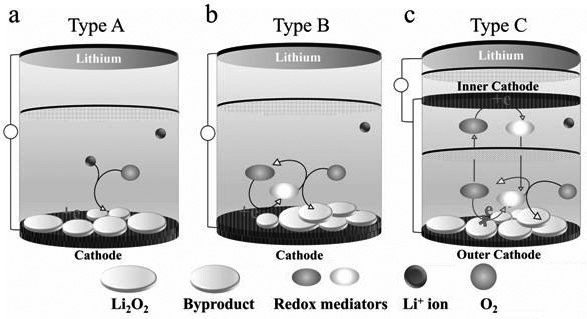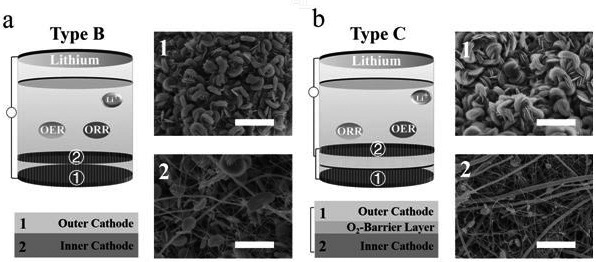A double-cathode structure and a lithium-oxygen battery made using it
A lithium-oxygen battery and dual-cathode technology, which is applied in structural parts, battery electrodes, fuel cell half-cells and secondary battery-type half-cells, can solve the problem of battery charging potential rise, battery cycle condition deterioration, positive electrode Limitation of electron transfer and other issues, to achieve the effects of reducing by-product formation, improving cycle life, and reducing charging potential
- Summary
- Abstract
- Description
- Claims
- Application Information
AI Technical Summary
Problems solved by technology
Method used
Image
Examples
Embodiment 1
[0042] A method for assembling a lithium-oxygen battery with a double-cathode structure, the process is as follows:
[0043] (1) Preparation of electrolyte: LiTFSI, DBBQ, and TEMPO were dissolved in TEGDME to obtain electrolyte; the concentrations of LiTFSI, DBBQ, and TEMPO in TEGDME were 1 mol / L, 0.05 mol / L, and 0.2 mol / L, respectively;
[0044] (2) Preparation of inner cathode: cut the carbon film into a disc with a diameter of 1.6 cm, and then dry it in a vacuum oven at 80°C for 24 hours;
[0045] (3) Preparation of gas barrier layer: The polypropylene film was cut into discs with a diameter of 1.6 cm, and the porosity of the original barrier layer was 15% as measured by scanning electron microscopy; at the same time, for comparison, two other diameters of 1.6 cm polypropylene film discs, two discs were treated by plasma cleaning machine (power 11W) at room temperature for 5min and 10min respectively to obtain gas barrier layers with porosity of 50% and 80% respectively;
...
Embodiment 2
[0051] A method for assembling a lithium-air battery with a double-cathode structure, the process is as follows:
[0052] The difference from Example 1 is that the gas atmosphere in step (7) is air with a humidity of 25%. The battery fabrication process was as follows: the above single-cathode lithium-oxygen battery and double-cathode lithium-oxygen battery were assembled in an argon-filled glove box, packaged, and then the batteries were transferred to an air atmosphere with a humidity of 25%, left for four hours, and sealed. , and tested in a constant temperature oven at a temperature of 30 °C.
Embodiment 3
[0054] A preparation method of a conventional lithium-oxygen battery, the process is as follows:
[0055] The difference from Example 1 lies in step (1) preparation of electrolyte: LiTFSI is dissolved in TEGDME to obtain electrolyte; the concentration of LiTFSI is 1 mol / L.
[0056] The difference from Example 1 is that there is no PSS-Li / GO-Li / GF separator and no gas barrier layer in step (6). That is, the assembly sequence of a conventional lithium-oxygen battery is a lithium sheet, a glass fiber separator soaked in 90 μL of the above-mentioned LiTFSI electrolyte, an inner cathode, and an outer cathode.
[0057] To study the post-cycling discharge electrodes, the cells were disassembled in an Ar-filled glove box. The electrodes were carefully removed and immersed in ethylene glycol dimethyl ether (DME) for about 6 h. The impregnation process was then repeated several times to completely remove the electrolyte. After this, the electrodes were placed in a vacuum chamber and ...
PUM
| Property | Measurement | Unit |
|---|---|---|
| diameter | aaaaa | aaaaa |
| water content | aaaaa | aaaaa |
| water content | aaaaa | aaaaa |
Abstract
Description
Claims
Application Information
 Login to View More
Login to View More - R&D
- Intellectual Property
- Life Sciences
- Materials
- Tech Scout
- Unparalleled Data Quality
- Higher Quality Content
- 60% Fewer Hallucinations
Browse by: Latest US Patents, China's latest patents, Technical Efficacy Thesaurus, Application Domain, Technology Topic, Popular Technical Reports.
© 2025 PatSnap. All rights reserved.Legal|Privacy policy|Modern Slavery Act Transparency Statement|Sitemap|About US| Contact US: help@patsnap.com



